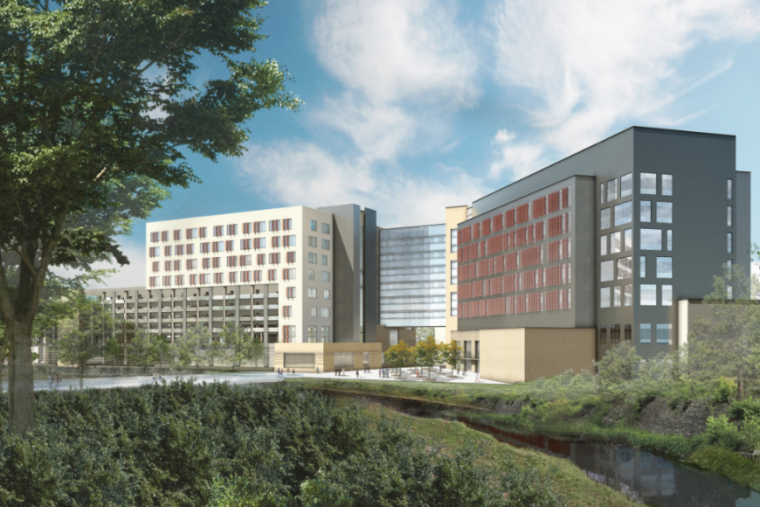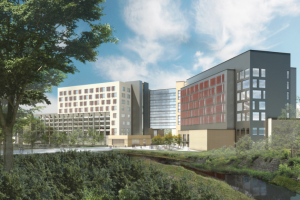

Image provided by Dell Medical School.
The doors of the new Dell Medical School at The University of Texas at Austin haven’t opened yet, but officials already are working toward making the medical school a national leader in health care innovation.
Medical school Founding Dean Clay Johnston, M.D., has his sights set on reinventing the Austin school and setting what could become the standard for future medical schools. With the assistance and support of UT Austin officials and an impressive team of faculty and staff, the vision for the Dell Medical School is one that is focused on individual community needs rather than traditional one-size-fits-all medical care borne out of classrooms where curriculum has been slow to change. This will be accomplished largely through collaborative efforts among the medical school, the university, the community and private partners.
Johnston is leading the charge to break the mold of traditional delivery of medical research, training and health care at the new medical school.
Officials will welcome the first medical school class in June 2016. However, the wheels of change and innovation have been turning since January 2014, when Johnston was named dean. Because the school is new – the nation’s first new top-tier research university in 50 years – it has no legacy programs to preserve and is starting with a clean slate. The founding dean hopes to use that opportunity to plant the seed for a new culture at the medical school before the first class of 50 students walks through its doors next summer.
The concept of the Dell Medical School is one of innovation. Johnston defines innovation as the generating of creative solutions to problems – solutions that meet the real problems of the people.
The dean is hopeful that a new approach to health care and academic medicine and focusing first on community health needs will allow Dell Medical School to transform health care not only in Austin and Travis County, but nationwide.
Texas Health Catalyst, an initiative launched in June by the medical school and UT Austin, is designed to identify research that has the potential to result in health-related products. Seed grants will be provided for projects that have no other source of financial support and individuals with successful experience in developing and commercializing products that can impact health will provide expert counsel and guidance.
Another initiative that the school will build directly into its educational offerings is an “Innovation and Leadership” block, a nine-month course selection for medical students. The students will be allowed to elect from three tracks: population health, health care redesign or research. Students will work on real problems in the American health care system and will try to find solutions. As part of the project, a medical technology accelerator will be established to move successful projects toward commercialization.
The Model Healthy Campus initiative will be focused on allowing students to develop plans to create a “model health city and community” within Austin and Travis County. UT Austin will be part of that initiative. Successful initiatives on campus will then become a model for other schools.
Because Travis County voters approved a 2012 referendum to fund the medical school, UT and medical school officials are determined to ensure that the Dell Medical School is focused on the uniqueness of Austin-area communities and their specific health care needs. Joining with UT Austin, the Travis County health care district, Dell Medical School and other partners, the objective is to implement a program based on innovation, redesign and futuristic-thinking.
As the new school evolves, it will become the medical school of the future. The eyes of health care professionals throughout the world are watching what happens in Texas … and that is about as exciting as it gets for proud Texans.
Subscribe to SPI’s newsletters for the latest information on innovation in government and higher education!
